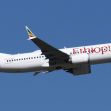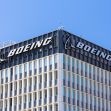Boeing has agreed to plead guilty to misleading air safety regulators prior to two deadly 737 MAX crashes, marking a significant concession that will label the world’s largest aerospace company a felon. This development comes after a federal court filing late Sunday.
The plea agreement involves Boeing formally acknowledging its guilt and accepting additional penalties over its interactions with the Federal Aviation Administration (FAA) before the crashes that killed 346 people. As part of the plea to one count of conspiracy to defraud the U.S., prosecutors have requested the company pay a $244 million criminal fine and spend $455 million over three years to improve compliance and safety programs. Additionally, Boeing must hire an independent monitor for three years to oversee these improvements. The plea agreement still requires court approval.
Pleading guilty could pose significant business challenges for Boeing, including potential suspension or barring as a defense contractor. Boeing, which was awarded Defense Department contracts worth $22.8 billion last year, is expected to seek a waiver from these consequences. The company is currently in discussions with the Defense Department regarding this issue.
The plea agreement also includes a provision for Boeing’s board of directors to meet with the families of the crash victims. Despite this, the settlement falls short of what these families had sought, which included a fine of up to $25 billion, a prosecution trial without concessions, and additional charges against the company and its executives.
Boeing faces three years of court-supervised probation, during which it could incur further penalties if it fails to comply with the terms of the agreement. The decision, disclosed in a Justice Department filing in federal court in Fort Worth, Texas, calls for a hearing on the plea agreement to be scheduled in July.
A spokesperson for the Justice Department said the deal holds Boeing accountable and protects the public, while Boeing confirmed the agreement but declined to comment further.
An attorney for the victims' families indicated they would object to the DOJ’s deal, arguing it unfairly makes concessions to Boeing that other criminal defendants would not receive and fails to hold Boeing fully accountable for the deaths.
The plea agreement supersedes a more lenient 2021 punishment, where prosecutors agreed to defer a criminal charge if Boeing remained compliant over three years. The current negotiations were prompted by Boeing's failure to comply with a core requirement of its probationary agreement: maintaining an effective compliance program.
Boeing had previously admitted that two former employees misled the FAA about a new flight-control feature on the 737 MAX, which was not meant to activate during normal flying conditions. In the 2018 and 2019 crashes, pilots were unable to regain control when the plane’s noses were forced downward due to repeated, erroneous activations of this system.
The Justice Department launched a criminal investigation shortly after the first crash of a Lion Air flight in October 2018, which killed 189 people. The focus was on how Boeing employees communicated with the FAA about the cockpit feature before the regulator decided on pilot training requirements for the new jet model.
The initial settlement in January 2021 required Boeing to pay a $243.6 million criminal fine and $500 million to compensate the families of deceased passengers, avoiding the assignment of a corporate monitor despite some Justice Department attorneys’ arguments for one.
However, the case took a turn when prosecutors failed to notify the families of the crash victims about the settlement terms, violating a law that protects crime victims' rights. This led to the families challenging the settlement for being too lenient.
Further complicating matters, a federal jury acquitted the only individual charged in the case, a former Boeing pilot accused of misleading the FAA about the flight-control feature. The pilot's lawyers successfully argued that he was unaware of the changes and did not lie to regulators.
The settlement was upended in May 2024 when prosecutors indicated Boeing had failed to maintain an effective compliance program, voiding the original agreement. This led to the government demanding that Boeing plead guilty or face a criminal trial.
The families of the victims have urged the judge overseeing the case, Reed O’Connor, to reject the plea. Under federal rules, Judge O’Connor can only approve or reject the plea deal in its entirety. The Justice Department's filing described the charge as “the most serious readily provable offense.”
Boeing still faces ongoing civil litigation related to the crashes. The company has accepted liability for the deaths of passengers in the second 737 MAX crash, operated by Ethiopian Airlines, and continues to face lawsuits from families affected by the 2018 Lion Air crash, though many claims have been settled.






